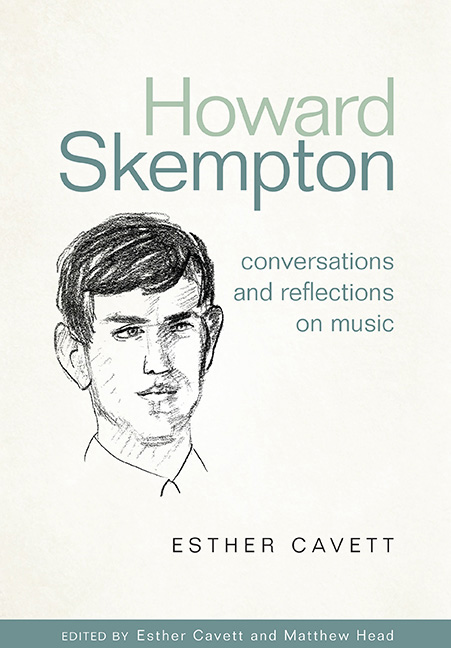Book contents
- Frontmatter
- Dedication
- Contents
- List of illustrations
- List of contributors
- Preface
- Roles and acknowledgements
- Introduction
- Editorial conventions
- Timeline
- Chapter One Histories
- Chapter Two Influences
- Chapter Three Pattern and shape
- Interval: Previously unpublished manuscripts
- Chapter Four Influencing
- Conversation Four: On teaching composition
- Lessons were “magical”: Skempton's composition students
- Reflection Four, “Not a lot spoken, but a lot said”: Skempton as teacher and composer
- Chapter Five Performing
- Chapter Six Narrative and closure
- Appendix One Authorized worklist
- Appendix Two Discography of first commercially distributed recordings
- Select bibliography
- Index
Conversation Four: On teaching composition
from Chapter Four - Influencing
Published online by Cambridge University Press: 10 September 2019
- Frontmatter
- Dedication
- Contents
- List of illustrations
- List of contributors
- Preface
- Roles and acknowledgements
- Introduction
- Editorial conventions
- Timeline
- Chapter One Histories
- Chapter Two Influences
- Chapter Three Pattern and shape
- Interval: Previously unpublished manuscripts
- Chapter Four Influencing
- Conversation Four: On teaching composition
- Lessons were “magical”: Skempton's composition students
- Reflection Four, “Not a lot spoken, but a lot said”: Skempton as teacher and composer
- Chapter Five Performing
- Chapter Six Narrative and closure
- Appendix One Authorized worklist
- Appendix Two Discography of first commercially distributed recordings
- Select bibliography
- Index
Summary
FOCUSING ON FUNDAMENTALS
EC: Today we plan to talk about teaching composition, but may I start by asking what you yourself learn from teaching it?
HS: Cardew once said that he regarded the Scratch Orchestra as a sort of oracle. What he meant was that it raised questions and it was almost a way of focusing his own thoughts. I think teaching focuses your thoughts because again it takes you back to the questions you had when you were young. It takes you back to fundamental questions which you might not normally ask yourself, that you feel obliged to ask yourself when you are faced with a group of young people.
EC: With composition teaching, as with teaching of other subjects, particularly perhaps practical ones, you are presumably influenced by the way you have been taught? In recent years of course there has been a move to teach people how to teach. Previously, if you were a good practical musician (including a composer) you were then asked to teach and left to get on with it. The assumption was that you could teach something you could do well yourself.
HS: Yes, I was certainly influenced as a teacher by the way Cardew worked with me. Being practical, but not imposing his ideas, for example.
EC: My recollection of being taught composition by Nicola LeFanu is that she said at the beginning, to her group of green undergraduates, don't intellectualize it too much. Don't think of composition as taking a line for a walk. Instead take a note for a walk. So, she was seemingly trying to help people who were not necessarily aspiring to be composers for the rest of their lives to get something on the page. Presumably you're teaching people who are more experienced than that?
HS: Increasingly I'm teaching graduates, but when I started at the Birmingham Conservatoire as a visiting composer, I was teaching all the undergraduates, seeing each student once or twice a year. And then I would see possibly one or two postgraduates eight to ten times a year, and then I might have one or two people I have seen over the whole degree course.
- Type
- Chapter
- Information
- Howard Skempton: Conversations and Reflections on Music , pp. 129 - 143Publisher: Boydell & BrewerPrint publication year: 2019

